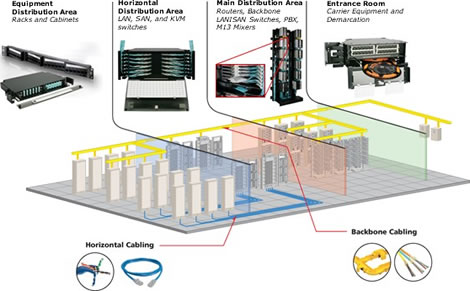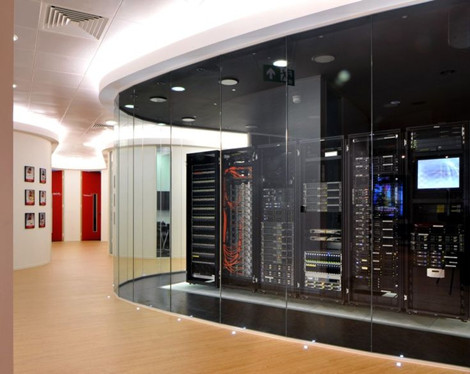Every enterprise or small business that needed a server was required to invest in its own infrastructure, hardware and maintenance solutions, with all the equipment accommodated in a dedicated room of the office. However, thanks to the cloud technology and the rapidly increasing availability of fiber connectivity, other options like data center have opened up in recent years. So how should you decide whether you will go with a data center service or a server room? To ease out the confusion, today’s article presents the differences between data center and server rooms.
Data Center & Server Room
Of course, every company has their own needs, and what works best for one company is not necessarily going to be the best solution for another. A server room is a room that devoted to store servers. A data center, to this purpose, is a whole building specially designed to contain and support a large amount of computing hardware of some sort.
The main difference between them is the size, but it is linked to design, scale and purpose. There will be several server rooms in almost any modern office building, but only very large companies whose business is about processing data will have data centers. The following part will continue to provide the detailed information about the pros and cons of each approach so you can determine what makes the most sense for you.
The Advantages and Disadvantages of Data Center
Pros—If you are just starting up your business, you may find it valuable to keep your network systems in a data center as you can enjoy and provide the same services to other companies to keep your costs down. As for the maintenance responsibility, every data center has the redundant backup system for network access, electricity and climate control, so you are not very likely to experience the network outage. Even in the case of a local power utility outage, they remain up and running owing to the backup power generators. Figure 1 outlines a brief diagram of data center solution.

Another unique feature of the data center is that enterprises appreciate the colocation model, which allows you to bring you own hardware to the shared facility. Depending on the nature of the data center, you may or may not have the ability to determine when your scheduled maintenance down times will be, and you may or may not be able to choose what hardware is being used for your server stacks.
Cons—Although data center possesses all the above advantages, you can’t miss the point of finical burden involved with infrastructure and maintenance as well as the upfront costs for moving to a data center. Particularly if you opt for a colocation data center, where you provide both hardware and software, there may be major spending involved. Even if the data center provides all of these resources, you have to pay the initial subscription and setup fees. What’s worst, over time, these fees may begin to feel negligible, especially as compared to the ongoing cost of an in-house server stack.
When you remove your server from your premises, you're going to lose a certain degree of potential for in-house oversight and control. If you completely outsource your server stack, you end up being fully dependent on the data center for maintenance, security and uptime. This may well be to your advantage, but many prefer to be less dependent on remote third parties.
The Advantages and Disadvantages of Building a Sever Room
Pros—Just as Figure 2 shows a server rooms with all the hardware and software located in a dedicate room of office, it means you completely own the server facility. All of the responsibility falls on you, but in exchange, you get to enjoy all of the benefits that only your company can control. You'll be the sole manager of your own facilities, and you can modify your system on your own terms, to accommodate any shifting needs, including expansion as your business scales up. That kind of versatile customization can be particularly useful if your system is unusually complicated, large, or includes many diverse applications.

The security issues also all comes down to you, which grants you control over your system in a way that moving it offsite cannot provide.
Cons—All the responsibility of the server room falls on you, but at the same time, you have to devote all your heart and energy to it, which is far beyond the substantial workload. First of all, you may need your IT team to focus on initiatives that related to your business, and the ritual maintenance of the health of the server stacks and physical infrastructure. Their attention will be split, then it will end up with work failure.
Another downside about sever room is that the backups is less effective especially when your data is stored in one physical location. In the event of theft, fire, flood or other disaster, you could end up losing everything with no recourse for recovery. Keeping your network local, moreover, makes it harder to expand your business to new locations. When you do open up new branches, you'll need to find good solutions for everyone to connect to headquarters, instead of both locations connecting to a facility that's made for offsite networking, which is the case with data centers.
Upfront costs is significant when you invest in your own onsite servers, and you won't have any way of knowing from the get-go how much capacity for growth you need to account for, so you'll end up purchasing a system that's either more powerful than you need or that isn't able to grow as your data needs expand.
Which One is Best for You?
After going through the whole passage, I bet you might have made up you won mind of whether to make use of a data center or to opt for your own server room. Many factors you should take into account—budget, your network scale & future proofing, but sometimes it is just a matter of personal preferences. The best way to make the decision, therefore, is to consult with an expert who can assist you in determining given the specifics of your case. FS.COM offers a full range of data center solutions that can be also used in server rooms like the patch panels, fiber enclosure, cable manager, fiber optic cable and transceivers.
评论
发表评论